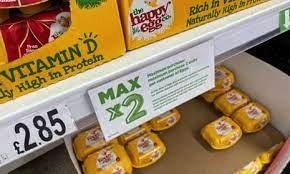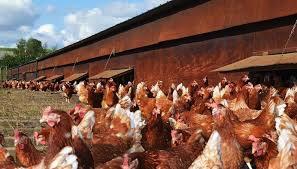 Consumers in the U.K. endured a 16.7 percent increase in food prices over the four weeks through January 22nd compared to the same period in 2022. This compares with food inflation of 10.4 percent for the year ending December 2022 in the U.S. Food manufacturers including Nestle and Unilever are experiencing high ingredient costs that they are attempting to pass on to retailers who add margins to reach shelf prices.
Consumers in the U.K. endured a 16.7 percent increase in food prices over the four weeks through January 22nd compared to the same period in 2022. This compares with food inflation of 10.4 percent for the year ending December 2022 in the U.S. Food manufacturers including Nestle and Unilever are experiencing high ingredient costs that they are attempting to pass on to retailers who add margins to reach shelf prices.
Unintended consequences of chains forcing low wholesale price has disrupted supply chains. The most striking example is the pressure placed on producers of free-range eggs to hold prices in the face of 50 percent increases in feed cost. No producer can afford to sell below cost and accordingly many ceased production. This resulted in a shortage of eggs on supermarket shelves. Some chains have been forced to make ex gratia payments to producers to restore their supply of eggs.
 Large manufacturers including Unilever, Nestle and Kraft-Heinz have limited the range of products available and have reduced the weight of packaged units in response to rising costs and reluctance on the part of supermarket chains to agree to price increases. This again has resulted in out-of-stock situations and empty shelves. Deep discounters Aldi and Lidl have negotiated lower prices for house brands and are gaining market share at the expense of larger chains. The strategy of offering lower prices for equivalent products, although with a limited selection, is attracting consumers faced with shrinking food budgets due to escalation in the cost of utilities and fuel in the U.K.
Large manufacturers including Unilever, Nestle and Kraft-Heinz have limited the range of products available and have reduced the weight of packaged units in response to rising costs and reluctance on the part of supermarket chains to agree to price increases. This again has resulted in out-of-stock situations and empty shelves. Deep discounters Aldi and Lidl have negotiated lower prices for house brands and are gaining market share at the expense of larger chains. The strategy of offering lower prices for equivalent products, although with a limited selection, is attracting consumers faced with shrinking food budgets due to escalation in the cost of utilities and fuel in the U.K.
Cost pressures associated with the invasion of Ukraine by the Russian Federation and the self-inflicted wound of Brexit have created a cost spiral in food in the U.K that has no immediate prospect of resolution. Regrettably it is evident that conflict between suppliers and supermarket chains involving the blame-game will continue to the detriment of producers, retailers and consumers.